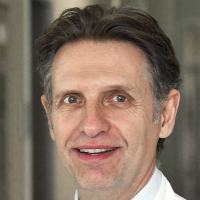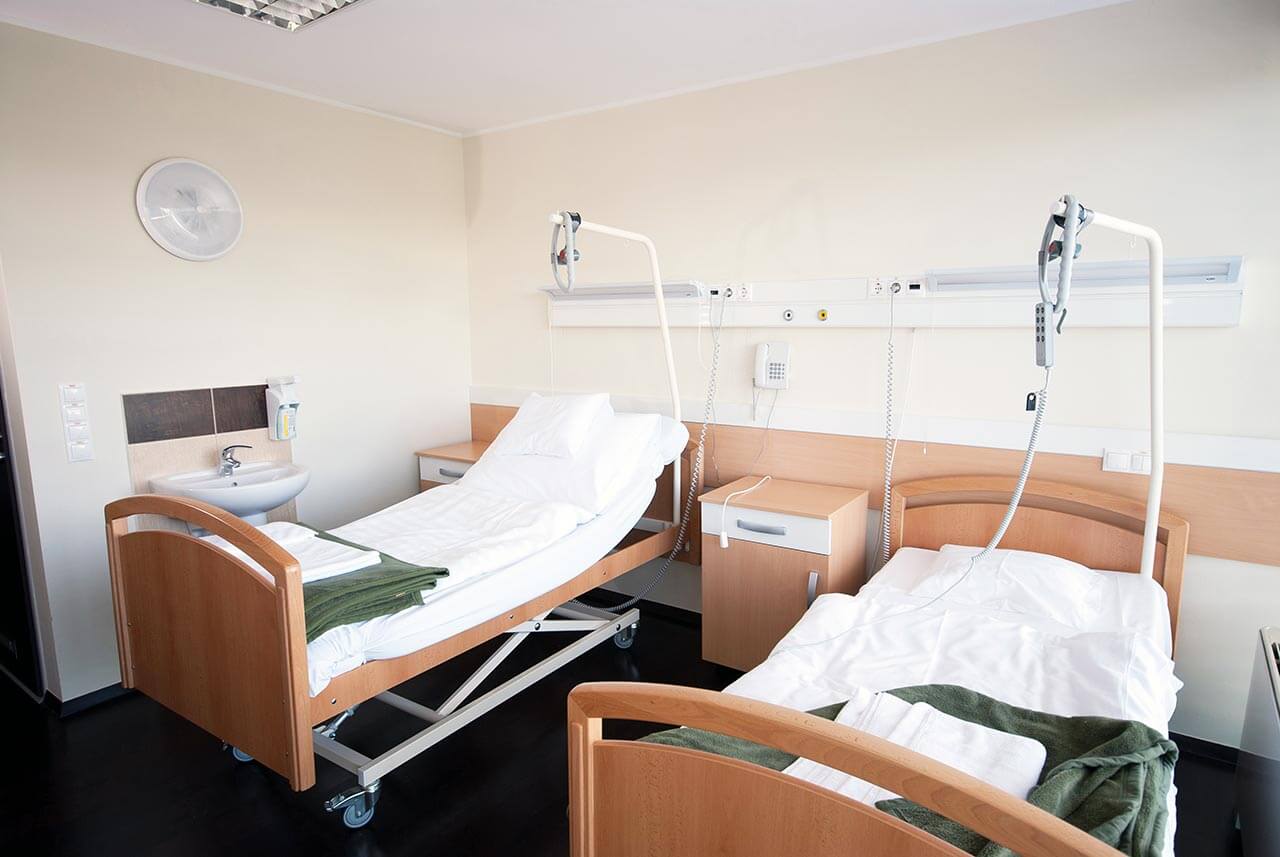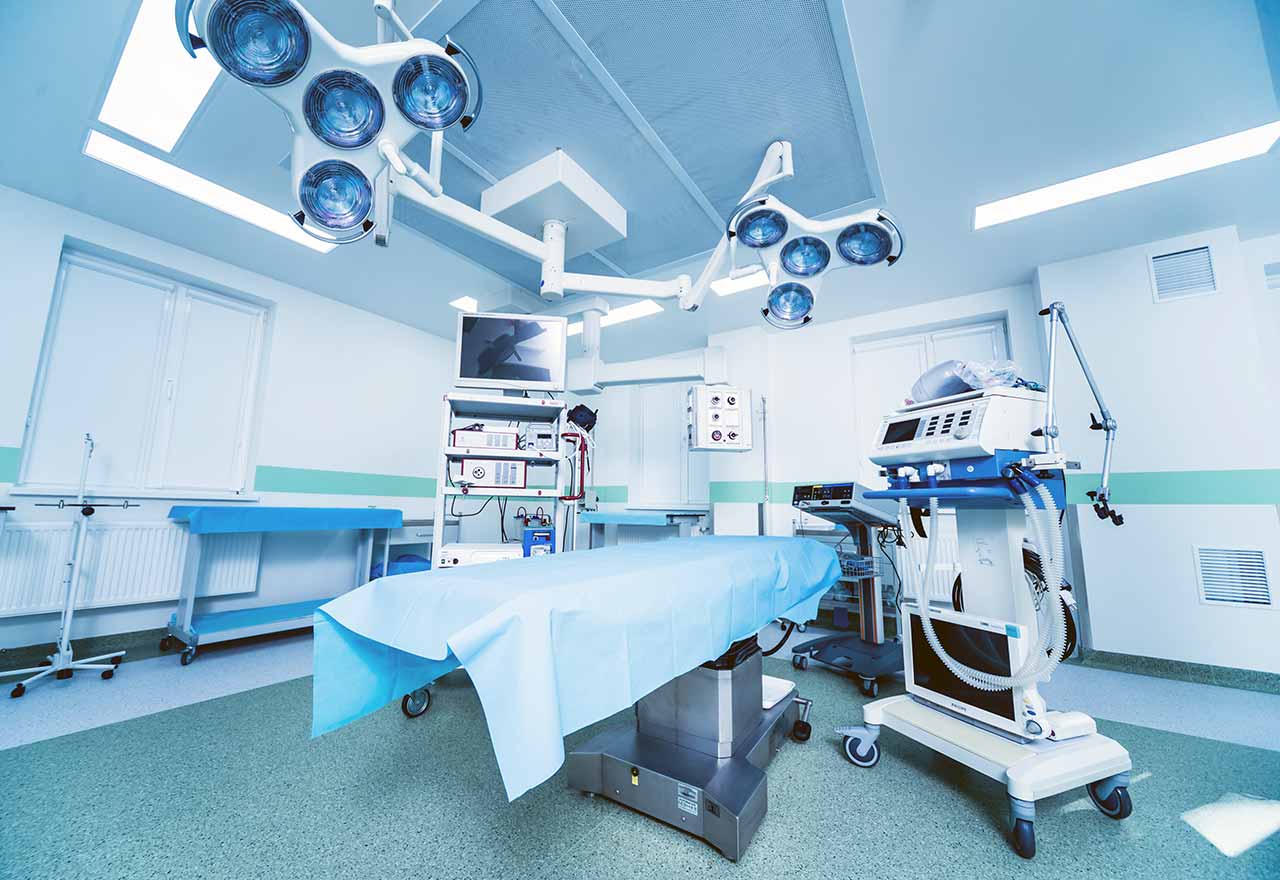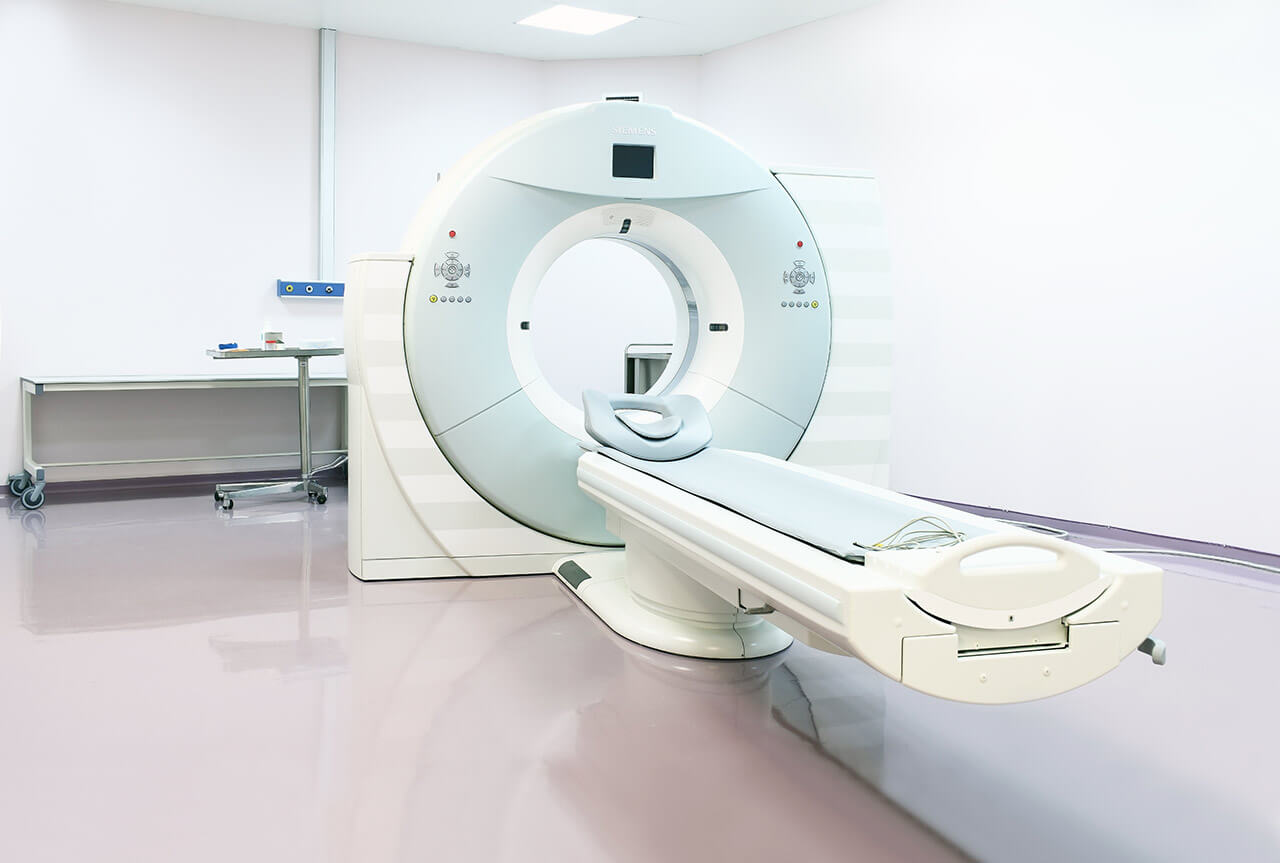
The program includes:
- Initial presentation in the clinic
- clinical history taking
- physical examination
- laboratory examination
- complete blood count
- general urine analysis
- biochemical blood test
- hormone test (TSH, fT3, fT4)
- ultrasound examination of thyroid gland
- CT/ MRI (if clinically indicated, additional cost is 650/1200 €)
- scintigraphy of thyroid gland (if clinically indicated, additional cost is 1600 €)
- FNA biopsy with histological study (if clinically indicated, additional cost is 1500 €)
- nursing staff services
- services of all leading experts
- explanation of individual treatment plan
Required documents
- Medical records
- Thyroid ultrasound (if available)
- Biopsy results (if available)
Service
You may also book:
 BookingHealth Price from:
BookingHealth Price from:
About the department
The Department of Gastroenterology, Hepatology and Endocrinology at the HELIOS University Hospital Wuppertal offers the widest range of services in the areas of its specialization and is one of the largest medical facilities of this kind in Germany. The team of the department's doctors carries out high-precision diagnostics and effective treatment of diseases of the gastrointestinal tract, liver and biliary tract, as well as endocrine glands. The department's therapeutic offer also includes the provision of medical care to patients with type I and II diabetes mellitus. The gastroenterologists of the medical facility have at their disposal a specialized Section for Endoscopy and Sonography, where they perform a variety of diagnostic and therapeutic procedures: color and pulsed Doppler ultrasonography, liver elastography, esophagogastroduodenoscopy, colonoscopy and capsule endoscopy, argon plasma coagulation, polypectomy, endoscopic mucosal resection, biliary stricture balloon dilatation and others. In addition, the department has a Section for Gastrointestinal Functional Diagnostics. The department has 80 beds. The medical facility provides treatment to more than 4,800 inpatients every year, and many patients receive outpatient medical services. The Head Physician of the department is Prof. Dr. med. Christian Prinz.
The department's primary focus is on the diagnostics and treatment of digestive diseases. The doctor studies the patient's medical history and listens to his complaints during the first consultation, after which he prescribes the necessary set of laboratory tests and ultrasound scans. If the results of ultrasound examination do not allow making an accurate diagnosis, the attending physician plans further diagnostic measures – endoscopic procedures. Depending on the specific indications, the department carries out endoscopic examinations such as esophagogastroduodenoscopy, colonoscopy, double balloon enteroscopy for examining the small intestine, small bowel capsule endoscopy, endoscopic retrograde cholangiopancreatography, chromoendoscopy for early detection of gastrointestinal neoplasms, etc. Whenever required, the diagnostic plan also includes tomographic imaging tests: CT and/or MRI. The department's specialists have vast experience in the field of their competence, and therefore they guarantee high accuracy of diagnosis and effectiveness of further treatment. The therapy regimen is developed on an individual basis, taking into account the specific clinical case and the patient's health status. If possible, the treatment of gastrointestinal diseases begins with modern pharmacotherapy. Nevertheless, it is impossible to get rid of some pathological gastrointestinal conditions exclusively with the help of medications. In such cases, the department's gastroenterologists consider the option of endoscopic therapy. The patients of the department are offered all types of modern endoscopic procedures, including measures to stop bleeding, resection of benign neoplasms and malignant tumors at the early stages, elimination of stenosis of the intestine, esophagus and other digestive organs, removal of bile duct stones, etc.
The department is part of the Colon Cancer Center certified by the German Cancer Society (DKG). The department’s specialists recommend patients to undergo regular preventive colonoscopy that helps them to detect colon polyps (precursors of colon cancer) and remove them using endoscopic techniques. However, if the patient seeks medical care in the advanced stages of cancer, more extensive surgery is required (laparoscopic interventions are performed, if clinically indicated). In addition, the treatment protocol for advanced colon cancer usually includes chemotherapy and radiation therapy. The patients also receive effective palliative care for pain management at the advanced stages of cancer.
An equally important focus of the department's clinical practice is on the treatment of liver and biliary tract diseases. The doctors of the medical facility pay special attention to the treatment of viral and autoimmune hepatitis, cholestatic liver lesions, fatty liver disease, cystic liver neoplasms, benign and malignant liver tumors, as well as liver cirrhosis. The area of responsibility of the department's hepatologists includes pharmacotherapy and endoscopic therapeutic procedures. In complex clinical cases, the patient may require surgery, which is performed in collaboration with abdominal surgeons.
Endocrinologists of the medical facility admit patients with diseases of the endocrine glands: thyroid gland, parathyroid glands and adrenal glands. The department's doctors also specialize in the treatment of type I and II diabetes mellitus. To diagnose endocrine disorders, hormone tests and ultrasound scanning are sufficient in most cases. The treatment involves the use of various pharmacotherapy regimens. The treatment tactics are adjusted in accordance with the patient's needs and wishes.
The department's range of diagnostic and therapeutic services includes:
- Diagnostics
- Ultrasound examinations
- B-mode sonography
- Doppler ultrasonography (color and pulsed)
- Contrast-enhanced ultrasound
- Liver elastography (for diagnosing fibrosis)
- 3D fusion sonography with CT or MRI
- Fine needle aspiration biopsy and ultrasound-guided needle biopsy
- Endoscopic examinations
- Esophagogastroduodenoscopy
- Colonoscopy
- Double balloon enteroscopy for examining the small intestine
- Small bowel capsule endoscopy
- Endoscopic retrograde cholangiopancreatography
- Chromoendoscopy for early detection of tumors, including virtual chromoendoscopy using FICE or NBI technology
- Endosonographic examinations
- Endosonographic elastography
- Contrast-enhanced endosonography
- Color duplex endosonography
- Functional diagnostics
- Hydrogen breath tests to diagnose intolerance to fructose, lactose, sorbitol, glucose, lactulose, etc.
- 24-hour pH metry
- Esophageal impedance pH monitoring
- Esophageal manometry
- Full range of laboratory tests in the field of gastroenterology, hepatology and endocrinology
- Ultrasound examinations
- Treatment
- Pharmacotherapy with modern medications
- Ultrasound-guided interventional procedures
- Percutaneous ethanol injections for the treatment of early stages of liver cancer
- Sclerotherapy for liver cysts
- Interventional procedures under the guidance of ultrasound and other imaging devices
- Puncture and drainage (for example, for abscesses, pseudocysts)
- Portal vein embolization prior to liver resection (in collaboration with radiology specialists)
- Endoscopic interventional procedures
- Hemostasis (arrest of bleeding)
- Injections, including histoacryl
- Clipping
- Stopping massive arterial bleeding using the OTSC clipping system
- Argon plasma coagulation for angiodysplasia
- Resection of benign and malignant gastrointestinal tumors at the early stages
- Polypectomy
- Endoscopic mucosal resection
- Endoscopic submucosal dissection
- Closure of perforations using the OTSC clipping system
- Balloon dilation and bougienage for stenosis (for example, esophageal, bowel stenosis)
- Implantation of self-expanding metal stents for stenosis (for example, esophageal, duodenal, colon stenosis)
- Endoscopic placement of feeding tubes into the stomach or small intestine for percutaneous feeding (PEG, PEJ)
- Endoscopic retrograde cholangiopancreatography
- Gallstone removal
- Implantation of plastic or metal stents for stenosis
- Balloon dilatation for bile duct stenosis
- Electrohydraulic lithotripsy with cholangioscopic guidance
- Percutaneous cholangioscopy with bile duct stone removal
- Endoscopic retrograde cholangiopancreatography using the rendez-vous technique
- Extracorporeal shock wave lithotripsy for crushing pancreatic duct stones
- Hemostasis (arrest of bleeding)
- Endosonographic interventional procedures
- Drainage of pancreatic pseudocysts with follow-up implantation of plastic or metal stents
- Tumor marking for radiation therapy using a fiducial marker
- Injection therapy for certain types of tumors
- Other medical services
Curriculum vitae
Higher Education and Professional Career
- 1983 - 1986 Study of Human Medicine, Saarland University, Homburg, Saarland.
- 1983 - 1986 Study of Chemistry, Saarland University, Homburg, Saarland.
- 1986 - 1990 Study of Human Medicine, Technical University of Munich.
- 1991 Admission to medical practice, Technical University of Munich.
- 1990 - 2000 Assistant Physician, University Hospital of Ludwig Maximilian University of Munich and University Hospital Rechts der Isar Munich.
- 2000 - 2010 Senior Physician and Head of the Endoscopy Section, University Hospital Rechts der Isar Munich.
- Since 01.03.2010 Head Physician of the Department of Gastroenterology, Hepatology and Endocrinology at the HELIOS University Hospital Wuppertal and Professor (Head of Department) at the Witten/Herdecke University.
- Since 2015 Head of the Certified Abdominal Cancer Center at the HELIOS University Hospital Wuppertal, as well as Head of the Working Group on Gastroenterology and Hepatology of the HELIOS Hospital Group.
Photo of the doctor: (c) Helios Universitätsklinikum Wuppertal
About hospital
According to the prestigious Focus magazine, the HELIOS University Hospital Wuppertal ranks among the top medical facilities in Germany!
The hospital rightfully enjoys the status of the maximum care medical facility and provides its high-quality services in all modern fields of medicine. The hospital operates on the basis of the Witten/Herdecke University, which was opened in 1982 and today is considered one of the best in Germany. Thus, many head physicians of the medical complex are in charge of the corresponding department at the university, which contributes to the close intertwining of research activities and clinical practice. The hospital has long traditions and its own values – the main goal of doctors is to provide comprehensive medical care focused not only on curing the disease, but also on the patient's personal needs.
The hospital has 1,000 beds. The doctors of the medical facility admit more than 50,000 inpatients annually. In addition, more than 100,000 outpatients undergo diagnostic and therapeutic procedures. Such high attendance rates speak for themselves and are undeniable proof of the high-quality medical service of the European level. The medical staff of the hospital has more than 2,500 employees, whose main task is to restore the patient's health and provide him with a decent quality of life.
The hospital has more than 26 specialized departments, as well as many narrowly focused centers and institutes dealing with the treatment of patients suffering from a particular group of diseases: Breast Center, Cancer Center, Cardiology Center, Trauma Center, Spine Center and others. The primary clinical focus of the medical center is cancer treatment.
For more than 25 years, the hospital has been running a special quality management system for medical care, which regulates the aspects of work of the medical staff, compliance with hygiene and safety standards during diagnostics and treatment. Consequently, patients can be sure that their health is in the safe hands of true professionals who work in accordance with the latest medical standards.
Special attention should be paid to the honors of the hospital for excellent patient care. The medical complex has quality certificates from the German Cancer Society (DKG), the German Trauma Society (DGU), the German Cardiac Society (DGK), the German Stroke Society (DSG) and other professional German societies.
Photo: (с) depositphotos
Accommodation in hospital
Patients rooms
The patients of the HELIOS University Hospital Wuppertal live in comfortable single, double, triple and quadruple rooms. Each patient room has an ensuite bathroom with shower and toilet. The standard room furnishings include a comfortable automatically adjustable bed, a bedside table, a wardrobe, a TV and a telephone. The hospital has Wi-Fi (free). For maximum patient comfort, there is a nurse call device on the bedside table. This device allows the patient to control the TV, radio, turn on or off the lights, and adjust the position of the bed.
The patients of the hospital are also offered accommodation in enhanced-comfort rooms. These rooms additionally provide a safe and a free minibar with soft drinks. The enhanced-comfort rooms also have a spacious bathroom with hairdryer, bathrobe, towels and toiletries.
Meals and Menus
The patients of the hospital are offered three meals a day: breakfast, lunch and dinner. The menu offers a variety of delicious dishes to suit all tastes, including dietary and vegetarian options.
The hospital also has a bistro where one can taste delicious hot dishes, cold snacks, desserts, as well as a cup of tea, coffee or refreshments.
The patients staying in enhanced-comfort rooms are offered a separate menu that includes a wider and more refined range of dishes. In addition, fresh fruit, tea, coffee and desserts are delivered to the patient room every day, if desired.
Further details
Standard rooms include:
Religion
The religious services are available upon request.
Accompanying person
During an inpatient program, your accompanying person can stay with you in the patient room or in the hotel of your choice.
Hotel
During an outpatient program, you can stay in the hotel of your choice. Our managers will help you choose the most suitable options.




